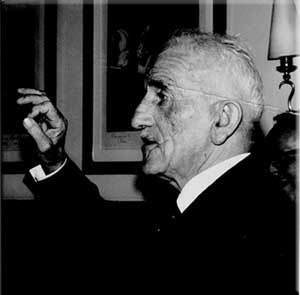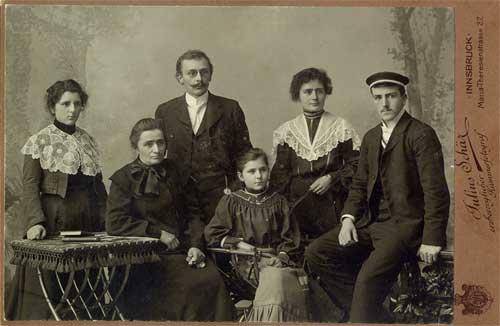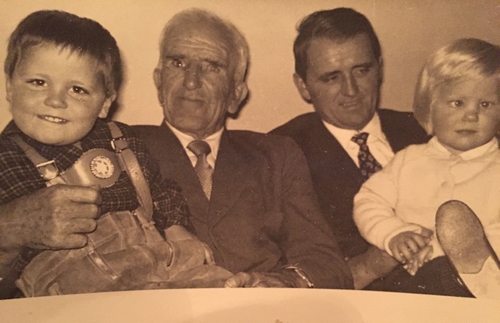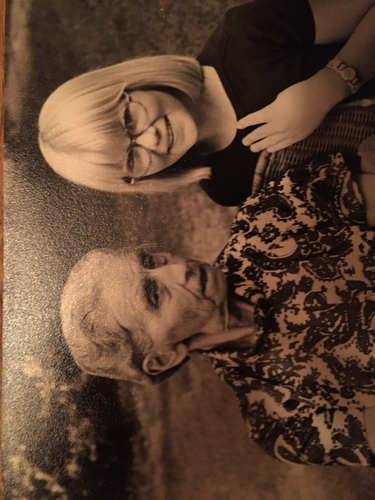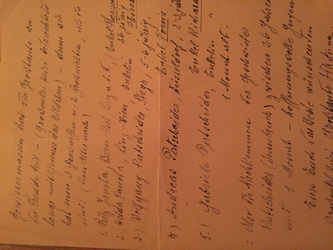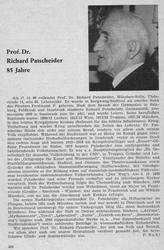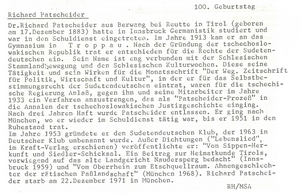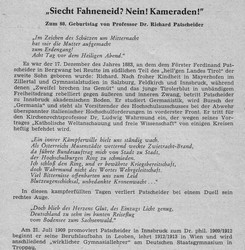Dr.phil. Richard PATSCHEIDER 1883-1971
- Born: Dec. 17th, 1883 in Berwang near Reutte (Austria)
- Died: Dec. 22nd, 1971 in Munich (Germany)
Parents:
- Father: PATSCHEIDER S. Ferdinand 1849-1897
- Mother: SCHUCHTER Adelheid 1854-1911
Marriage:
- on July 28th, 1914 in Troppau (CZE) with Andrea HELD
Children:
- Helga PATSCHEIDER born Feb. 14th, 1916 in Leoben (Austria)
- Heinz C. Martin PATSCHEIDER born Apr. 5th, 1920 in Troppau (CZE)
- Adelheid PATSCHEIDER born July 26th, 1923 in Sternberg/Moravia (CZE)
- Harold Klaus PATSCHEIDER born July 7th, 1927 in Troppau (CZE)
(Author's note: my paternal great uncle)
Stations in life:
He was born in Berwang as the second son of the forester Ferdinand Patscheider. He spent his childhood in Mayrhofen in the Zillertal (Tyrol). After attending high schools in Salzburg, Feldkirch and Innsbruck (Austria), Richard Patscheider studied German language and literature, received his doctorate in Innsbruck on July 21, 1909, and became a teacher.
His professional stations were: 1909-12 Leoben, 1912-13 Vienna, 1913-33 Troppau, 1937-39 Munich, in the last years of the war Krakow (adviser for higher education). War, arrest and war again interrupted the times of teaching.
Dr. Richard Patscheider felt committed not only to his profession, but above all to his people. During his studies in Innsbruck, he was a motor in the fight against excessive Italian university demands. He lost his right eye in a duel, and did front-line service in the south as a war volunteer and "one" officer in 1915-1918. In 1919 he began extensive and pioneering folk work. He was, among other things, a main board member of the "German Society for German National Education in the ZCE" in Troppau, founder and leader of the "Local Group for Art and Science", chairman of the district and city education committee, city councilor and chairman of the theater committee, as well as founder of the Silesian tribal land movement (cultural weeks). With like-minded people, he strove for the formation of a Sudeten German national association based on tribal-landscape federalism ("The Way").
On Oct. 4th, 1933, Richard Patscheider and his friends were arrested and sentenced to years in prison in a trial that caused a sensation at the time ("Patscheider Trial"). After their release from prison, he moved to Munich. In 1939, Dr. Patscheider re-enlisted for military service, serving as a major on the front lines (Grodno - Smolensk - Vyazma), then in France and at the Military Area Command Munich, from where he was seconded to Krakow.
After the war, he was banned from working for several years, forcing him to spend the first post-war years as an unskilled laborer in Pinzgau (Salzburg). He later returned to Munich, where he taught German at a grammar school until he retired in 1951.
He was constantly active for the Sudeten Germans in Austria as well as in Germany. In 1953 he founded the Sudeten German Club in Munich, which was renamed the German Club in 1963.
The books written during the imprisonment in Ostrava ("Argopa", "Mythensonate", "Tyrol", "Lebenslied", "Sunta", "Dietrich von Bern", "Rosenkreuzzug") were followed after 1945 by genealogical works ("vom Oberrhein zum Etschquellraum" (published in 1967 by Verlag Robert Lerche, Munich) and "Von Sippenherkunft und Siedlerschicksal") as well as numerous contributions to scientific journals.
The Patscheider Trial:
To be able to understand the Patscheider trial, one must first keep in mind the historical situation: the former Austrian and Prussian territories such as Silesia, Bohemia and Moravia became the Czechoslovak Republic after WW1. However, in the border area (Czech Sudety) a majority German population remained. Due to the re-emergence of the German Reich in the 1930s, the desire of the population of this border region for an affiliation with Germany also germinated strongly.
Sensitized by the activities of the Sudeten German Home Front, the Czech state authorities tightened the measures in the borderland and watched with suspicion every sign of a possible political unification between the Sudetenland and Germany. Exactly at this time the Patscheider trial took place in Ostrava.
Nobody knew at that time how the world political situation would continue, but today we know that Hitler's pressure to occupy the Sudetenland militarily was increasing. In order to save the peace in Europe, a conference between Chamberlain and Hitler (Mussolini and France also negotiated, but not Czechoslovakia!) took place in Munich, which resulted in the Munich Agreement, which transferred the Sudetenland to Germany. Hitler then took the rest of the Czech Republic unasked on March 5, 1939. After WW2, the Sudetenland was then awarded to Czechoslovakia. With the Beneš Decrees (issued during the war) the German population was declared enemies of the state, expatriated, expropriated and forced to emigrate.
Back to the 1930s: After Hitler came to power in Germany, some nationalist circles radicalized in the Sudetenland, which was still hard hit by the economic crisis. In October 1933, Konrad Henlein, a sports teacher, founded the Sudeten German Home Front, a political movement that sought to rally Sudeten Germans across parties and estates. The Czechoslovak state authorities ruled with increased suspicion and tried to prevent any sign of a possible political union between the Sudetenland and Germany.
Dr. Richard Patscheider taught German at the Gymnasium in Troppau during this time and somehow, probably through a hodgepodge of his own statements, through activities in Sudeten German associations and through some nationalistic essays by his students, which he tolerated, he came into the crosshairs of the authorities. He had also come to the attention of the Czechoslovak authorities earlier because of his alleged "anti-Czech and anti-state attitude". Likewise, he had hardly concealed his German nationalist sentiments as a member of the municipal council of the city of Troppau.
In the fall of 1933, in the Silesian town of Troppau, an action of the Czechoslovak State Police against alleged state enemies took place. There were house searches and arrests almost daily. On Oct. 4th, 1933, Dr. Richard Patscheider and his friends were arrested. The main charge was the accused's anti-state activity. He was accused of threatening the integrity of Czechoslovakia in connection with foreign institutions. The prosecutor judged the activities, which were allegedly intended to lead to the construction of a new "Silesian tribe", to be clearly "Greater German"-oriented actions.
In the course of the trial, more than 20 people were indicted, among them some former students of the Gymnasium and the well-known folk educator Dr. Emil Lehmann, who used to be a middle school professor in Landskron. Lehmann, like Patscheider, was convicted, but since he fled the Republic, he was not imprisoned.
The trial began in December 1935 and made headlines on the front pages of the German press of the time; in Troppau it caused quite a stir. The testimonies of Dr. Patscheider's former students, who were summoned as witnesses before the court, gave Patscheider a thoroughly favorable report (German newspaper Bohemia 18.12.1935, 2). The public prosecutor, however, was of a different opinion, referring to some confiscated homework of Patscheider's 7th grade students from the school year 1931-32, in which Great German and anti-Czechoslovakian ideas were discovered and the Third Reich was glorified.
As far as can be gathered from the newspapers, he was emaciated at the start of the trial and in a very poor condition, both mentally and physically. Whether this is due to the almost two years of pre-trial detention or to poor conditions of detention remains open.
In court, he defended himself by presenting his political views as a "Slavic-Germanic federalism". He repeated this opinion vehemently also in his closing words: I confess "that my political ideal is the federation of Central Europe." The goal was to work on a balance between East German and West Slavic. According to him, his activity in the association "Bereitschaft" would have brought a synthesis between "loyalty to the people and loyalty to the state".
On March 24, 1936, Dr. Richard Patscheider was found guilty and sentenced to four years of hard labor, loss of all civil rights and a fine of 10000 crowns. The verdict document is in the state archives in Prague, it comprises 500 pages! The pre-trial detention was credited, so that he was released early on Dec. 20th, 1936. The loss of his citizenship rights for 5 years destroyed his professional career, he was forced to leave the country and so he moved to Munich in 1937.
Not only the verdict is surprising, but also the force of the state intervention is remarkable. It is suspected that Patscheider, who had made a name for himself in the organization "Bereitschaft zur Arbeit für Jugenderziehung und Volksbildung in der T.S.R.," was denounced by opponents from the "Kameradschaftsbund." Also in the court case, insurmountable differences between the Sudeten German East and the Sudeten German West were pointed out several times.
Sources:
- Dissertation by Mirek Němec: Erziehung zum Staatsbürger? Deutsche Sekundarschulen in der Tschechoslowakei 1918-1938. Essen: Klartext-Verlag 2009, relevant pages 162-168.
- Excerpt from the German newspaper Bohemia, Patscheider trial, trial days on 17th and Dec. 19th 1935
- Excerpt from the German newspaper Bohemia, Patscheider trial, closing remarks by Dr. Richard Patscheider on Mar. 10th 1936
- Excerpt from Deutsche Zeitung Bohemia, Patscheider trial, pronouncement of verdict
- More newspaper clippings from 1935, unfortunately in very poor quality:
The trial was reported in detail in the German newspaper Bohemia, December 1935 - March 1936. I have the following copies (kindly sent by Mr. Mirek Němec):
